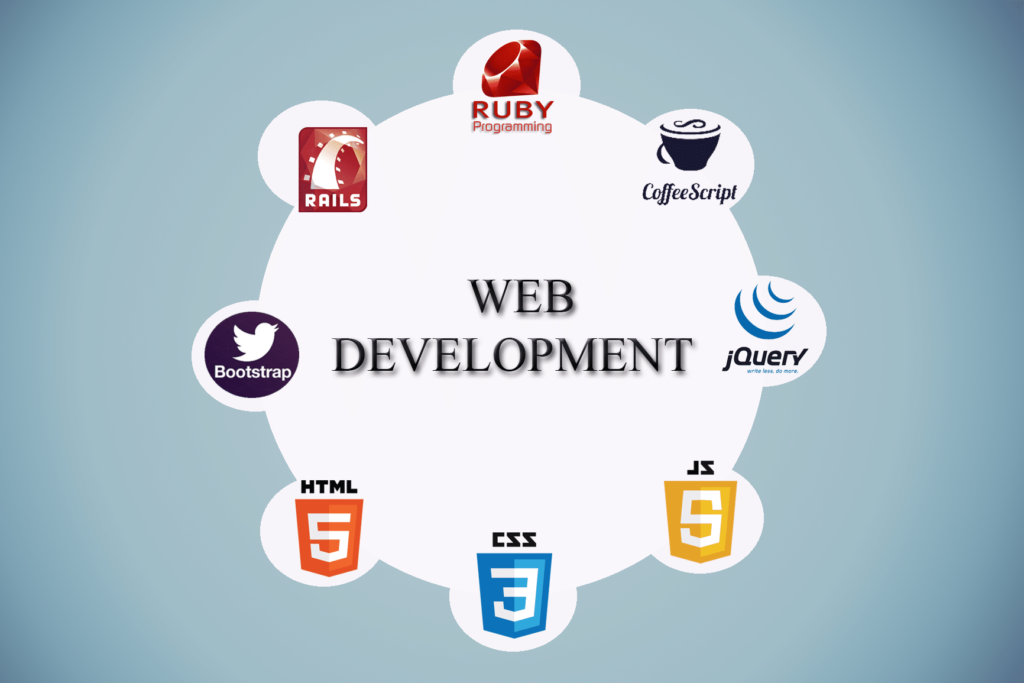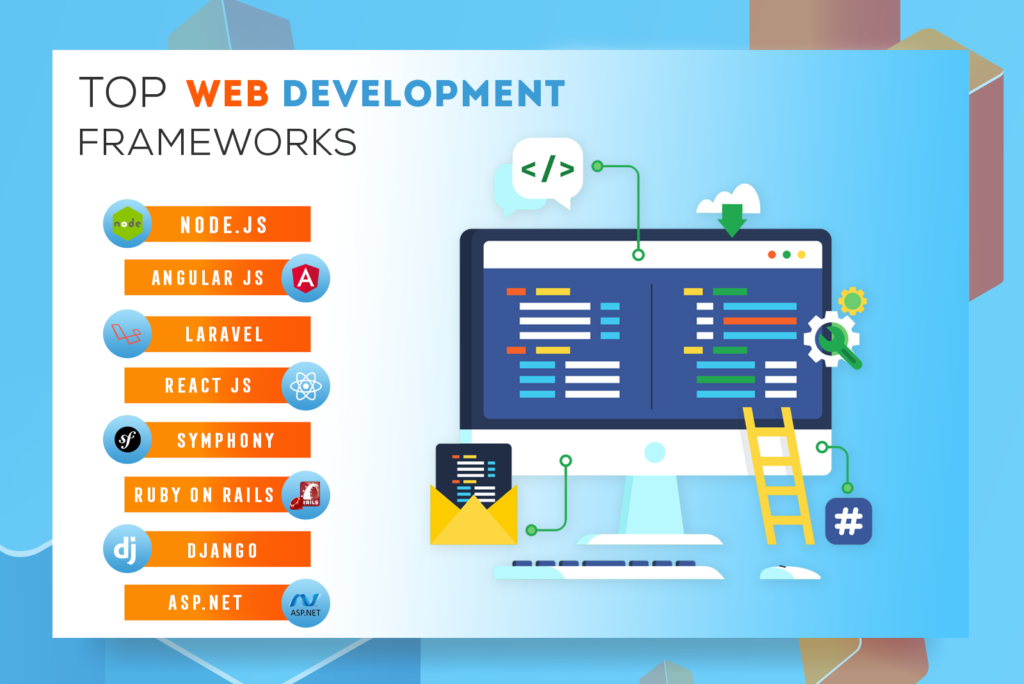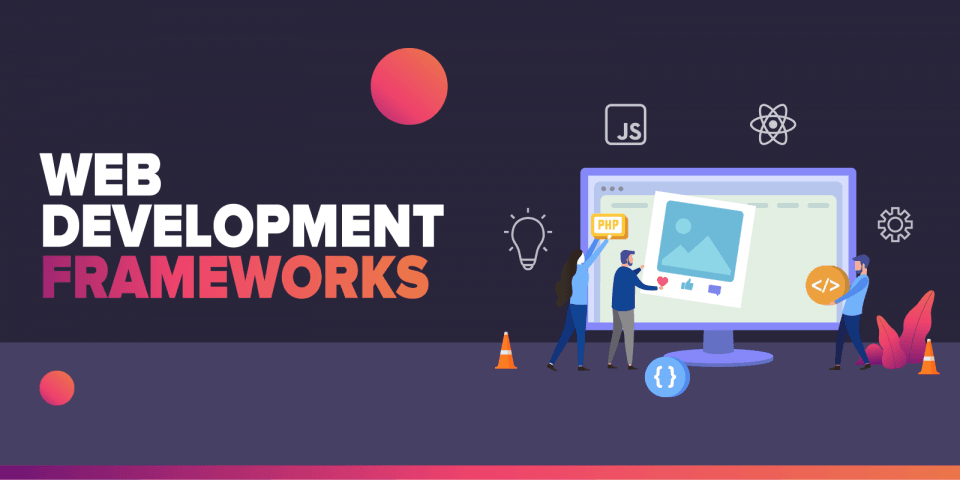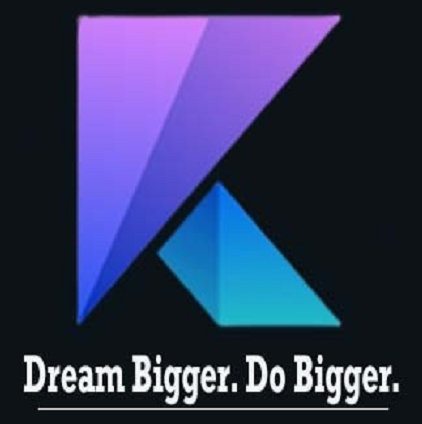For creating and releasing web applications, web development frameworks are crucial tools. Developers can save time without sacrificing quality or scalability by using these frameworks, which come with a pre-assembled collection of components, tools, and libraries.

In 2023, these are some of the best options for web development frameworks.

- React.js is a front-end framework that is actively developed and supported by Facebook. It is one of the most widely used frameworks due to its ease of use, adaptability, and speed. With React.js and its virtual DOM framework, developers can quickly and simply create sophisticated user interfaces. It’s a great option for making single-page applications, and it’s simple to combine with other systems.
- Another widely used front-end framework is Angular.js, which is developed and supported by Google. It’s a fantastic choice for constructing complicated applications because it’s a complete framework that provides features like routeing and state management. However, Angular.js is less flexible and has a more difficult learning curve than React.js.
- Vue.js is a relatively new front-end framework, but it has quickly become popular. It’s well-known for being user-friendly, adaptable, and straightforward. Although it shares some similarities with React.js, Vue.js provides more functionality right out of the box. It’s simple to pick up and use, making it a great option for developing apps of any size.
- Express.js is a widely used back-end framework developed on top of Node.js. It is well-known for being user-friendly, adaptable, and scalable. Express.js is a great option for developing RESTful APIs and web apps because it comes pre-packaged with many useful features. Yet, compared to comparable back-end frameworks like Django and Ruby on Rails, it lacks in functionality.
- Django is a Python-based, all-inclusive back-end framework. It has a solid reputation for reliability, scalability, and safety. Django is a great option for developing advanced web applications due to its comprehensive feature set, which includes routeing and authentication. It’s less flexible and has a more challenging learning curve compared to other back-end frameworks.
- Ruby on Rails is a full-featured back-end framework developed on top of Ruby. It is well-known for the efficiency, effectiveness, and scalability it provides. Ruby on Rails is a great option for developing advanced web apps because it comes pre-packaged with many useful features. It has a longer learning curve than simpler frameworks like Flask and isn’t as fast as other back-end frameworks.
- Virtual Document Object Model for Efficient Rendering with React.js
- Architecture built on modules that facilitate code reuse
- Extensive network of software developers and resources
- Simple compatibility with existing systems
- In-built support for routeing, state management, and more make Angular.js a versatile framework.
- Two-way binding optimises data transfer and storage.
- Extensive network of software developers and resources
- Maintainable code requires strict grammar and organisation.
- Vue.js’ syntax is straightforward and simple to grasp.
- Scalable and adaptable design
- Simple compatibility with existing systems
- Compact compared to competing architectures
- Express.js: A Framework That Is Both Minimalistic And Lightweight
- Simple to pick up and use
- Extensive network of software developers, users, and libraries
- Perfect for constructing RESTful APIs and other kinds of web software
- Django is an all-encompassing framework that has many pre-configured functions, including authentication, routeing, and more.
- Superior in safety and scalability
- Powerful control panel for the app’s administration
- It’s perfect for creating sophisticated web applications.
- Effective framework with pre-assembled components for routeing, authentication, and more.
- Convention-based development is more time- and effort-efficient than configuration-based.
- Extensive network of software developers and resources
- Fantastic for creating sophisticated web applications
- When contrasting various web development frameworks, speed is an important issue to think about. The user experience, search engine rankings, and general success of a business can all be affected by how well a web application performs.
- Both React.js and Vue.js have a stellar reputation for speed and efficiency. Since user interfaces may be rendered efficiently using their virtual DOM system, page loads are sped up and overall speed is enhanced.
- Express.js is a back-end framework that is quick and lightweight. It’s scalable and can manage a large number of requests, making it a great choice for large-scale websites.
- Although Django and Ruby on Rails share a reputation for speed, they are also recognised for being resource hogs. Yet, their sturdiness and extensive features make them perfect for creating sophisticated web apps.
- The availability of an ecosystem of libraries and tools, as well as the quality of community support, should also be taken into account while choosing a framework. There are many resources available to enhance the capabilities of the popular frameworks React.js, Angular.js, and Vue.js. There are many people who use Express.js, Django, and Ruby on Rails, and there are many third-party tools and libraries accessible.
- When compared to Angular.js, Django, and Ruby on Rails, React.js and Vue are usually regarded as having a lower learning curve. Express.js is also a great option for developers that are new to back-end programming because it is simple to pick up and utilise.
- In the end, variables like performance, community support, and learning curve will determine which web development framework is selected for a given project and development team. Before settling on one, developers should weigh the pros and cons of each framework to be sure it will serve their purposes.
- When evaluating several options for web frameworks, developers should think about how secure each one is. Using a framework with strong security features can help guard against vulnerabilities and attacks, which is why security is so important in web development.
- Django has excellent security features, such as protection from cross-site scripting (XSS) and SQL injection attacks, which are both major web application weaknesses. User authentication, password hashing, and CSRF protection are also included.
- Features like user authentication and authorisation, as well as safeguards against SQL injection and cross-site scripting attacks, are all standard fare in Ruby on Rails.
- Although none of React.js, Angular.js, or Vue.js are inherently secure, they can be used in tandem with additional security tools and frameworks to create safe websites.
- Although though Express.js lacks in-built security features, it does provide middleware to handle typical security concerns, such as authentication and cross-site request forgery (CSRF) prevention.
- One further thing to think about is how well-supported and well-documented each framework is. Whether you’re working with React.js, Angular.js, Vue.js, Django, Ruby on Rails, or Express.js, you’ll have no trouble finding the answers you need online.
- Finally, it’s important to think about the larger ecosystem and accessible tools for each framework. The ability to use modern web development techniques, such as serverless architectures and containerization, as well as the availability of third-party frameworks and tools are all part of this.
- In conclusion, there is no universally “optimal” web development framework because this decision must be made based on the unique requirements of each team member and the nature of the project itself. When deciding on a framework, developers should take into account a wide range of criteria, including performance, security, community support, documentation, and ecosystem.
- The degree of scalability available is another thing to think about when contrasting web development frameworks. The term “scalability” is used to describe a system’s capacity to scale up in response to rising demand without degrading in speed or reliability.
- In terms of scalability, both Django and Ruby on Rails are highly regarded because of their powerful design and in-built functionality for managing database scaling, caching, and load balancing. They are great options for creating dependable and scalable enterprise-level online applications.
- Both React.js and Vue.js are lauded for their scalability because of their powerful rendering system and server-side rendering capability. Both are strong candidates for use in the construction of high-volume, high-performance user interfaces.
- The two-way data binding and in-built tools for managing routeing and state that make Angular.js so powerful also make it scalable.
- Express.js’s small footprint and high performance make it a top pick for developing scalable back-end software. It’s scalable both horizontally and vertically and can handle a large number of requests at once.
- The extent to which different frameworks may communicate with one another is another consideration. Does it play nicely with databases, application programming interfaces, front-end frameworks, and other technologies?
- All three of the most popular front-end frameworks—React.js, Angular.js, and Vue.js—provide seamless integration with a wide variety of other technologies. They are extremely flexible because they may be combined with so many different methods and devices.
- Express.js is a great option for developing scalable, interoperable back-end applications due to its compatibility with a broad variety of databases, APIs, and other back-end technologies.
- Both Django and Ruby on Rails have extensive feature sets and native support for databases, APIs, and other tools, making them very compatible and interoperable.
- Factors like performance, security, community support, documentation, and ecosystem are also important when evaluating web development frameworks, but scalability, compatibility, and interoperability are perhaps the most important. Developers can select a framework that is ideal for them and their project by giving serious consideration to the aforementioned criteria.
- When comparing web development frameworks, testing and debugging support is another crucial thing to think about. Having solid testing and debugging support can make it easier for developers to find and repair bugs in web application code throughout development and maintenance.
- There is robust support for testing and debugging in React.js, Angular.js, and Vue.js, with in-built tools for unit testing, integration testing, and more. They also benefit from robust communities that develop and distribute several libraries and tools for testing and debugging.
- Both Django and Ruby on Rails come with comprehensive testing frameworks and issue tracking and debugging tools. Automated testing and debugging of sophisticated web applications are made much simpler with their help.
- Express.js is a great option for developing scalable web apps because of its small footprint and adaptability. Common activities like logging and error handling that arise during testing and debugging are taken care of by the included middleware.
- The degree to which each framework can be adapted to specific needs is another consideration. The developers can adjust the settings of frameworks like React.js, Angular.js, and Vue.js to make them work for their specific projects. Django and Ruby on Rails are two others that provide additional functionality out of the box, which can reduce development time and effort.
- Express.js’s adaptability means that developers can create their own middleware and route handlers as needed. It’s incredibly adaptable because it works with such a wide variety of other tools and technologies.
- In conclusion, while evaluating web development frameworks, it is vital to think about performance, security, community support, documentation, and ecosystem in addition to testing and debugging assistance, flexibility, and customisation. Developers can select a framework that is ideal for them and their project by giving serious consideration to the aforementioned criteria.
- When evaluating web development frameworks, the availability of documentation and community assistance is another crucial point to think about. Having clear and comprehensive documentation can save developers a lot of time and frustration, as building web apps typically involves a lot of study and learning.
- There is a wealth of information available for learning React.js, Angular.js, and Vue.js, from the fundamentals to the more advanced approaches. They also have sizable, dynamic communities that produce and improve numerous open-source resources. This facilitates the discovery of solutions to technical issues and the acquisition of new skills among developers.
- Django and Ruby on Rails also have sizable communities and many of resources like forums and tutorials. They’ve been around for quite some time, and their extensive documentation and other tools are great for anyone looking to create sophisticated web apps.
- Lightweight frameworks like Express.js may not have as much documentation or user communities as their heavier counterparts. Despite this, it has extensive documentation and a vibrant community that has produced numerous free software libraries and tools.
- Finally, the ecosystem of each framework should be taken into account. Things like the number of third-party libraries and tools, how well they work with one another, and how stable the ecosystem as a whole all play a role.
- Developers may find a plethora of third-party libraries and tools for use with React.js, Angular.js, and Vue.js, all of which contribute to the ecosystems’ overall size and vitality. They are also extremely adaptable because of how well they combine with various front- and back-end technologies.
- Developers can choose from a broad variety of third-party libraries and tools for both Django and Ruby on Rails. They are a great option for developing advanced online applications because of their compatibility with many different databases, APIs, and front-end frameworks.
- Even while Express.js’ ecosystem is smaller than that of some other frameworks, it nevertheless receives excellent support and interfaces smoothly with a broad variety of databases, APIs, and front-end frameworks.
- Factors like as documentation, community support, ecosystem, testing and debugging, adaptability, scalability, compatibility, and interoperability should all be taken into account when evaluating web development frameworks. Developers can select a framework that is ideal for them and their project by giving serious consideration to the aforementioned criteria.
- Comparing web development frameworks also requires thinking about how well they scale and perform. It’s crucial that the framework supporting modern, complex online applications can scale to meet the demands of rising traffic and load.
- Excellent performance and scalability are hallmarks of frameworks like React.js, Angular.js, and Vue.js. They employ a virtual DOM that is easy to update, which reduces the load on the browser. Lazy loading, code splitting, and server-side rendering are just a few of the capabilities they provide that can help boost performance and scalability even further.
- Built-in capabilities such as caching, database connection pooling, and load balancing make both Django and Ruby on Rails very scalable. They are a great option for developing sophisticated web applications because of their capacity to manage heavy usage and massive data collections.
- Express.js is a great option for developing scalable web apps because it is little in size and quick to load. It’s compatibility with different tools and technologies means programmers can create programmes that meet their precise requirements.
- Finally, you should think about how safe each framework is. Since hostile actors frequently target web applications, it’s crucial to take extra precautions when developing them.
- Built-in security features of React.js, Angular.js, and Vue.js include Cross-Site Scripting (XSS) and Cross-Site Request Forgery (CSRF) protection, and their respective communities develop and maintain several security-related libraries and tools.
- Both Django and Ruby on Rails include robust encryption and protection against typical security flaws in addition to built-in security capabilities like authentication and authorisation.
- When used properly, Express.js offers a high level of security; however, developers must take measures to ensure it, such as implementing secure cookies and headers.
- Finally, when contrasting web development frameworks, it is essential to think about scalability and performance, security, documentation and community support, ecosystem, testing and debugging assistance, flexibility, compatibility, and interoperability. Developers can select a framework that is ideal for them and their project by giving serious consideration to the aforementioned criteria.
- Testing and debugging support is another thing to think about when comparing web development frameworks. Having reliable testing and debugging tools and methods can save developers a lot of time and work while still ensuring that they produce high-quality web applications.
- Writing and running tests for front-end components is simplified by the in-built testing frameworks and tools provided by popular frameworks like React.js, Angular.js, and Vue.js. They also provide tools for debugging, which aid programmers in finding and fixing bugs in their code.
- Both Django and Ruby on Rails come with extensive testing frameworks and tools, as well as debugging assistance that helps programmers find and fix bugs rapidly. Features like logging and error handling are also provided to aid developers in identifying and fixing application faults.
- Express.js is intended to be lightweight and versatile, however this design choice means that it lacks some of the other frameworks’ in-built testing and debugging features. However, Express.js interfaces nicely with other testing and debugging tools, and there are numerous third-party tools available that may be utilised with Express.js.
- Comparing web development frameworks also requires thinking about how adaptable each one is. The framework’s adaptability to varied use cases and project needs is what we mean when we talk about flexibility.
- Web applications come in many shapes and sizes, and thanks to the adaptability of frameworks like React.js, Angular.js, and Vue.js, they can all be created.
- Both Django and Ruby on Rails are opinionated frameworks with a great deal of predefined features and practises. This has the potential to facilitate the rapid development of sophisticated applications at the expense of flexibility in adapting the framework to the needs of individual projects.
- Express.js’s adaptability means it can be used to create anything from simple single-page apps to massive multi-tiered systems. It’s also very flexible, so programmers can modify it to meet their own requirements.
- Furthermore, while contrasting web development frameworks, compatibility and interoperability are crucial factors to think about. Interoperability refers to the framework’s capacity to function with different programming languages and platforms, while compatibility refers to its ability to work with different tools and technologies.
- There is a high degree of interoperability between React.js, Angular.js, and Vue.js with other front- and back-end frameworks. They play nicely with various languages and platforms, and can be used with a broad variety of libraries and tools.
- While Django and Ruby on Rails are optimised for particular database and web server combinations, they are adaptable enough to be utilised with others with a little tweaking. They also work well with a variety of different languages and environments.
- Express.js is quite compatible with various systems and can be used with many different kinds of databases and web servers. It also works well with a wide variety of other languages and environments.
- Finally, while contrasting web development frameworks, you should think about things like how well they enable testing and debugging, how adaptable they are, how compatible they are, and how interoperable they are. Developers can select a framework that is ideal for them and their project by giving serious consideration to the aforementioned criteria.
Read More : The Future of Web Development: best Trends to Watch in 2023

for best website development in Dallas Contact

